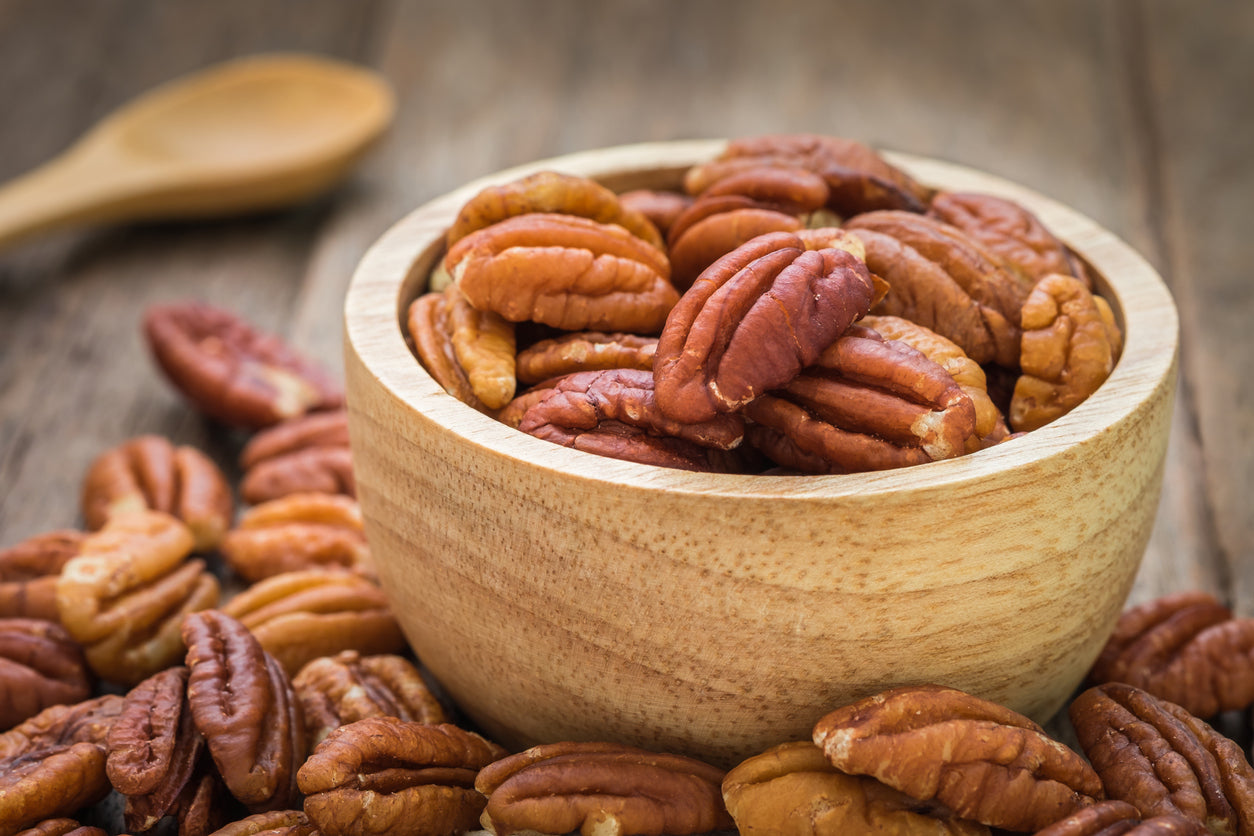The sweet health “perks” of eating pecans – this nutritious nut will surprise you

Who doesn’t love pecans? The rich, buttery flavor of these tempting tree nuts is reminiscent of caramel and brown sugar, while their gentle crunch adds satisfying texture.
Surprisingly, these tasty morsels - especially when nibbled “as is” and substituted for processed foods rich in saturated fats - could help you maintain a healthy weight. While it’s true that pecans are high in fats, experts say their fatty acids are of the anti-inflammatory monounsaturated and polyunsaturated varieties. In addition, pecans are crammed with essential vitamins and minerals.
Let’s look at other “gifts” of pecans for blood sugar, cholesterol levels, and overall health.
Pecans may improve insulin resistance and promote better blood sugar control
Two out of three American adults are currently either overweight or obese, according to the Centers for Disease Control and Prevention (CDC). Unfortunately, obesity is closely linked with the soaring national rates of type 2 diabetes and non-alcoholic fatty liver disease (both of which are verging on epidemic status in the United States). While pecans might appear to be unlikely nutritional heroes, recent research shows that they may be truly beneficial to health.
For example, one review of studies showed that adding tree nuts such as pecans to the diet could help lower levels of hemoglobin A1C, a measure of blood sugar control over time. In addition, a study published in Nutrients showed that a daily handful of pecans (when added to participants’ diets in place of other foods) improved insulin sensitivity in overweight and obese individuals, thereby helping with the transport of sugar from the blood into the cells.
The scientists concluded that replacing a portion of the saturated fats in the participants’ diets with pecans caused significant heart-healthy effects. “One small change - eating a handful of pecans daily - may have a large impact on the health of (these) at-risk adults,” said lead researcher Diane McKay, Ph.D. And this is not the only evidence linking pecans with improved heart and metabolic health.
Pecans are in good company - studies show tree nuts are linked with lower rates of heart disease
A study involving 100,000 participants showed that higher consumption of nuts was associated with lower rates of coronary heart disease and cardiovascular disease. In addition, multiple studies have suggested that pecans may help lower total cholesterol, LDL cholesterol, and triglycerides, or fats in the blood. One eye-opening study published in the Journal of Nutrition found that eating a handful of pecans daily may help lower cholesterol levels - to a level similar to that obtained by taking statin drugs!
A 2019 study published in the Journal of Human Nutrition and Diet showed that a daily one-ounce serving of pecans for 12 weeks improved the ratio of total cholesterol to HDL cholesterol for patients with stable coronary artery disease. (However, this study didn’t show a drop in LDL levels). Clearly, more research to pinpoint the cardiovascular benefits of pecans is needed. But, if you need any more evidence of pecans’ nutritional virtues, they are officially certified as a Heart-Healthy Food by the American Heart Association – not too shabby!
Protect cognitive function with tree nuts such as pecans, cashews, and walnuts
Monounsaturated and polyunsaturated fats have been linked in multiple studies to decreased mental decline and brain inflammation. One sizable study involving over 15,000 women aged 70 and above showed that higher consumption of nuts was linked with improved long-term cognition - including more efficient verbal recall and attention.
Another study showed that those who ate at least 10 grams of tree nuts per day were a stunning 40 percent less likely to have poor cognition! So it seems that nibbling on pecans and other nuts may help curb mild cognitive impairment and preserve brain function into old age.
Pecans offer a wealth of vitamins and minerals
Pecans are rich in bone-building calcium, magnesium, phosphorus, and potassium - and are also a great source of thiamine, or vitamin B1, essential for turning carbs into energy. Other “goodies” in pecans include generous amounts of copper and zinc - both important for immune health - and the antioxidant vitamins E and A. Containing 196 calories, an ounce of pecans offers up 2.5 grams of high-quality protein and 2.7 grams of dietary fiber.
Because pecans are relatively high in fat and calories, nutritionists and natural health experts advise moderate servings, with around one ounce (28 grams) a day appearing to be the “sweet spot” for health benefits. (Pro tip: This is about 20 pecan halves). And, for maximum benefit, opt for pecans without added sodium or sugar. Naturally, if you are allergic to tree nuts, don’t eat pecans.
Versatile pecans can be enjoyed out of hand as a snack or added to your favorite foods. Sprinkle chopped pecans on a mixed green salad - or add a note of sweetness by substituting them for walnuts in a classic Waldorf salad. You can also use them to add crunch to oatmeal or yogurt - or feature them with other nuts and raisins in trail mix. Chopped pecans can also be used in recipes to encrust salmon, chicken, and pork.
Nutritious, delicious, and convenient, pecans make a great addition to your healthy diet.
Sources for this article include:
-
Posted in
benefits of pecans, blood sugar control, healthy diet, healthy fats, tree nuts






